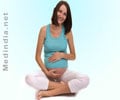Car crashes can be hazardous for pregnant women especially if they are not wearing a seat belt when the accident occurs, says study published in American Journal of Preventive Medicine.

The study, which is the largest retrospective state-based study of its kind, looked at data for 878,546 pregnant women aged 16-46 years who gave birth to a single infant in the state of North Carolina between 2001 and 2008. Using vital records and crash reports, investigators were able to study the association among car crashes, vehicle safety features, and adverse pregnancy outcomes.
Investigators focused on four pregnancy outcomes: preterm birth, placental abruption, premature rupture of the membranes, and stillbirth. They found that compared to women who were not involved in an auto accident, pregnant drivers had elevated rates of preterm birth, placental abruption, and premature rupture of the membranes after a single crash.
While previous studies had only looked at the link between one crash and adverse pregnancy outcomes, this new study also looked at women who had been involved in multiple motor vehicle collisions during their pregnancies. Following a second or subsequent crash, investigators found pregnant women had more highly elevated rates of preterm birth, placental abruption, premature rupture of the membranes and stillbirth. The investigators also found that the rates of these unfavorable outcomes increased as the number of crashes increased.
Regardless of the number of crashes, stillbirth rates were elevated following accidents involving unbelted pregnant drivers. "Non-seat belt use and the lack of airbags were associated with elevated rates of selected adverse pregnancy outcomes," explains lead investigator Catherine J. Vladutiu, PhD, Postdoctoral Fellow in the Department of Epidemiology at the University of North Carolina's Gillings School of Global Public Health. "Most notably, the stillbirth rate following a crash involving an unbelted pregnant driver was almost three times as high as the stillbirth rate following a crash involving a belted pregnant driver."
While this new study offers greater insight than existing reports, more population-based studies are necessary to increase understanding of the effect of multiple crashes, seatbelts, and airbags on pregnancy outcomes.
Source-Eurekalert
 MEDINDIA
MEDINDIA




 Email
Email










